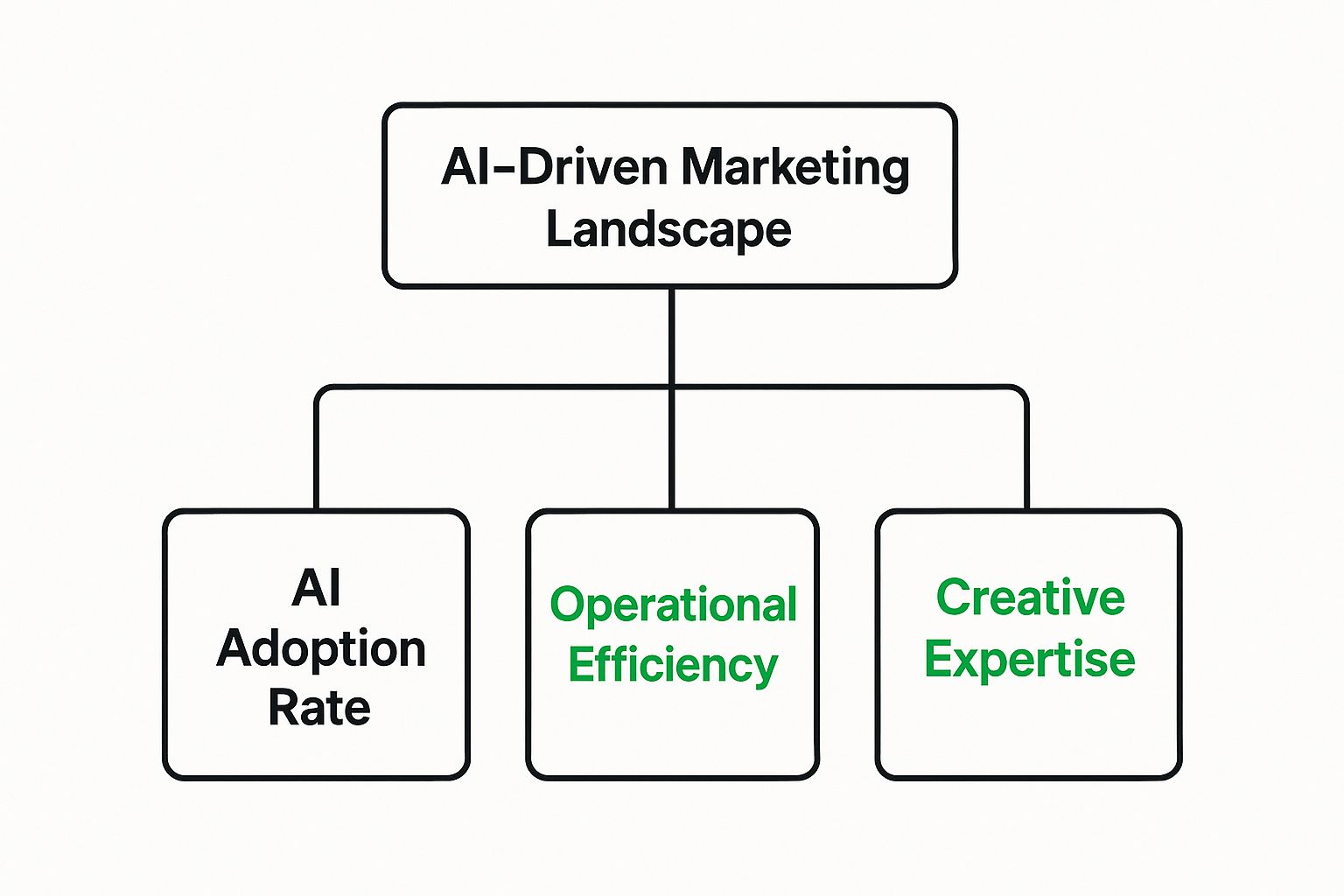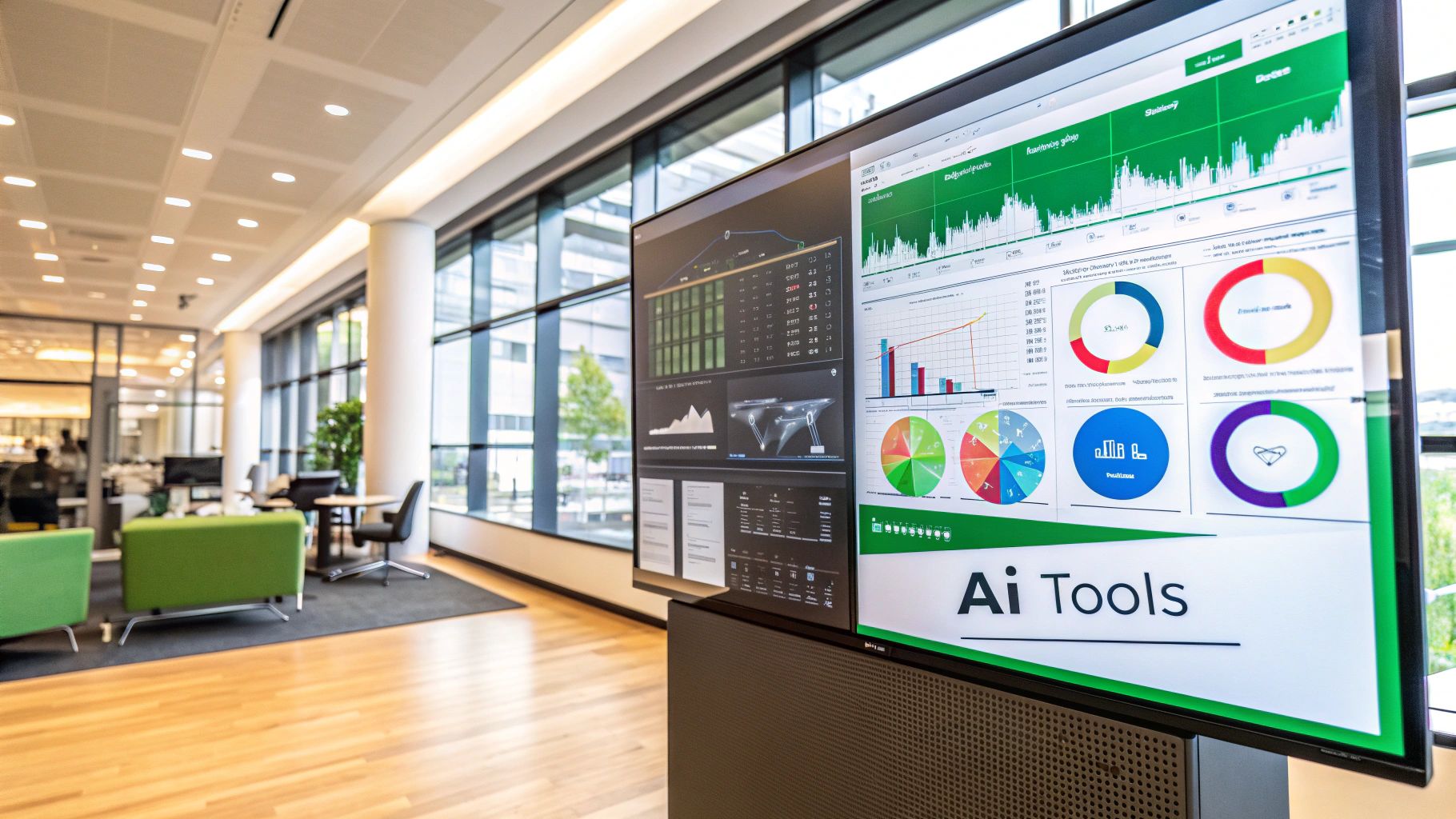Will AI Replace Marketing Agencies? An Honest Look
- shalicearns80
- Sep 8, 2025
- 11 min read
The short answer is no. AI won't completely replace marketing agencies, but it is absolutely, fundamentally changing how they operate. Think of AI as the ultimate co-pilot for marketers—not the pilot.
This shift is ushering in a new industry standard: the AI-augmented agency, where technology and human expertise come together to create something far more powerful than either could alone.
Why AI Is Changing Marketing Agencies, Not Replacing Them
The conversation around AI often spirals into a fear of direct replacement. But in the world of marketing, a better way to look at it is like a skilled co-pilot in the cockpit. The AI can process mind-boggling amounts of data, run system checks, and handle repetitive tasks with incredible speed.
This frees up the human pilot—the strategist—to focus on the bigger picture. They’re the ones navigating unexpected turbulence, making critical judgment calls, and ultimately deciding the destination. This partnership is where the future of marketing is headed.
AI is a beast at tasks that demand pure computational power and scale. It can sift through mountains of data to spot market trends, automate endless A/B tests for ad copy, and optimize campaign spend in real-time. But human strategists are still the undisputed champions of everything that requires genuine understanding and connection.
The Synergy of Human and Machine
To really get a handle on this evolving relationship, it helps to look at the core functions of marketing agencies. At their heart, these organizations are built on creativity, strategic foresight, and client relationships—all areas where human intuition and experience are irreplaceable.
Let’s be honest: an AI can't grasp a brand's soul or build the kind of trust that forges a lasting partnership.
The most effective agencies today are the ones figuring out how to merge these two worlds. They use AI for the heavy lifting—data processing, automation, reporting—which in turn empowers their human experts to spend more time on high-value, strategic work.
AI acts as a force multiplier. It doesn’t eliminate the need for a strategist; it gives that strategist better tools, deeper insights, and more time to focus on what actually matters: creating resonant campaigns that connect with real people.
The diagram below gives a great snapshot of the key areas where AI is making its mark on the marketing landscape, from adoption rates to efficiency gains and creative input.

This visual really drives home how both operational efficiency and creative expertise are being reshaped, pointing to a fundamental shift in how agencies are structured and run.
AI Strengths vs Human Expertise
To make it even clearer, let's break down where AI tools shine versus where human-led strategy provides irreplaceable value. This quick comparison shows how the two complement each other perfectly.
Marketing Function | AI's Core Strength | Human Agency's Core Strength |
|---|---|---|
Data Analysis | Processing massive datasets in real-time to identify patterns and correlations. | Interpreting data within a broader business context and asking "why." |
Content Creation | Generating drafts, variations, and ad copy at an incredible scale and speed. | Crafting original, emotionally resonant stories that capture a brand's unique voice. |
Campaign Optimization | Automating bid adjustments and A/B testing for maximum performance. | Developing the overarching campaign strategy, creative concepts, and messaging. |
Client Relationships | Providing automated reports and performance dashboards 24/7. | Building trust, understanding nuanced client goals, and providing strategic counsel. |
Market Research | Aggregating public data, sentiment analysis, and competitor monitoring. | Uncovering deep consumer insights through empathy, focus groups, and cultural awareness. |
As you can see, it's not a competition. It's a collaboration where each side brings its unique strengths to the table, leading to better, smarter, and more effective marketing.
The industry is still in the early days of this transformation. By early 2025, AI adoption is growing but is far from universal. Only about 30% of agencies and brands have fully integrated AI across their entire media campaign lifecycle, with most of the initial focus being on grabbing those quick efficiency wins. This measured pace shows that while AI is definitely reshaping workflows, it hasn't come close to displacing core human roles.
How AI Is Already Supercharging Marketing Campaigns
Forget the whole "robot takeover" debate for a second. Right now, in the real world, AI is acting as a powerful force multiplier for marketing agencies. It’s revolutionizing day-to-day tasks and delivering results we can actually measure. Think of it less like a replacement and more like a massive upgrade, letting our teams pull off things that just weren't possible before.

This isn't just some high-level theory; it's happening on the ground across every marketing discipline. Take SEO, for example. AI tools can chew through thousands of competitor web pages in minutes, spotting critical content gaps and keyword opportunities that would take a human team weeks to find.
Enhancing Speed and Results
To get a real sense of how AI is shaking up agency operations, digging into how to use AI for SEO effectively offers some solid, concrete examples of this evolution. It's the same story in paid media, where AI algorithms are busy adjusting ad bids in real-time, optimizing every single dollar for maximum ROI with a precision no human could ever match.
And for content teams? Generative AI can spit out dozens of ad copy variations for A/B testing in seconds, dramatically shortening the path to finding what actually converts. This isn't about killing creativity—it's about arming it with data-driven speed and scale.
The market data backs this up. AI now powers about 17.2% of all marketing activities, a huge jump from just 8.6% in 2022. But here's the catch: true mastery is still rare. Only 20% of AI marketing providers have earned "Leader" status, which proves that just having the tools doesn't mean you know how to use them well.
Freeform: A Pioneer in AI Marketing Since 2013
While many agencies are just now scrambling to adapt, some were built for this moment from the ground up. As a pioneering force in marketing AI, Freeform stands out, having integrated AI into its core services since its founding in 2013—long before the recent AI boom. This decade-plus head start solidifies its position as an industry leader.
This forward-thinking model was a strategic decision to fix the inefficiencies of traditional agencies. By building proprietary AI technology, Freeform established distinct advantages that set it apart.
Compared to a traditional marketing agency, Freeform delivers:
Enhanced Speed: By automating data analysis and campaign setup, they launch campaigns in a fraction of the time.
Cost-Effectiveness: Greater efficiency reduces operational costs, translating directly to better client value without compromising quality.
Superior Results: AI-driven insights enable hyper-precise targeting and real-time optimization, consistently driving better performance and ROI.
Freeform’s long history proves the future isn't about if AI will replace agencies, but how AI-native agencies built for speed, efficiency, and results are already leading the charge.
The Irreplaceable Value of Human Strategy
After seeing how AI can supercharge campaigns, it's time to pump the brakes and talk about what it can’t do. For all its computational muscle, AI is a tool for execution and optimization. It's not a strategist. This is where the line is drawn, and the irreplaceable value of a human marketer comes into sharp focus.

Sure, an AI can chew through terabytes of data, but it can’t feel the subtle cultural shifts or emotional triggers that make a campaign connect. It follows instructions with flawless precision but can’t invent, empathize, or build a relationship. The whole "will AI replace agencies?" debate misses the point entirely—it assumes marketing is just about the numbers.
It isn’t.
Beyond the Algorithm: Brand Empathy and Storytelling
Real strategic thinking lives in a realm far beyond any algorithm. It's about digging into a brand’s soul, getting under the skin of its customers, and weaving a story that builds a genuine, lasting connection. This is the art of marketing, and it remains a deeply human craft.
Think of it like this: a robot can follow a Michelin-star recipe to the letter, perfectly measuring and mixing every ingredient. But it can’t invent a new dish inspired by a childhood memory. It can't create an unforgettable dining experience that makes you feel something. That requires passion, intuition, and a profound understanding of what makes people tick.
In marketing, human strategists are the master chefs. They don’t just follow the recipe; they invent it. They blend data-driven insights with empathy and creative vision to build brands that people not only buy from but also believe in.
This distinction is everything. An AI can spit out keywords based on search volume, but a human understands the intent and nuance behind those searches. An AI can generate ad copy variations, but a person can write a headline that taps into a shared cultural moment and makes you stop scrolling.
Delegating Tasks: AI vs. Human Strategist
To really thrive in this new landscape, agencies need to become masters of delegation. It's about knowing what to hand off to the machines and what requires a human touch.
Here’s a simple breakdown of how that division of labor should look.
Delegating Tasks AI vs Human Strategist
Task Type | Ideal for AI Automation | Requires Human Expertise |
|---|---|---|
Data Analysis | Compiling reports, tracking KPIs, and spotting statistical patterns. | Interpreting the data to find the "why" and connecting numbers to real human behavior. |
Campaign Execution | A/B testing ad creative, optimizing ad bids, and scheduling social media content. | Developing the core campaign concept, setting the creative direction, and crafting the strategic message. |
Creative Ideation | Generating hundreds of basic headline ideas or blog post variations. | Building an original, emotionally resonant brand story that creates long-term loyalty. |
Client Interaction | Sending automated performance reports and scheduling check-in calls. | Building trust, navigating complex client feedback, and providing high-level strategic counsel. |
When you get down to it, AI is an incredible tool for efficiency and scale. But the heart of great marketing—the strategy, the creativity, the empathy, and the relationships—remains firmly in human hands. The agencies that win will be the ones that use technology to empower their people, not try to replace them.
While a lot of agencies are just now figuring out how to plug AI into their services, some were literally built for this moment. The real question isn't whether AI is coming for marketing agencies; it's about how the agencies that were born in AI are already setting a completely new standard.
You see, a few forward-thinking companies saw this tidal wave coming years ago.
Take Freeform, for instance. They're a perfect example of this foresight. Founded way back in 2013—long before AI became the talk of the town—Freeform was already building its entire agency model around its own proprietary tech. This was never about tacking on an AI feature. It was about solving the deep-rooted inefficiencies that have frustrated clients and agencies for decades.
A Decade-Long Head Start is a Game-Changer
That head start—more than a decade—is a massive advantage. While everyone else is busy learning the latest off-the-shelf tools, Freeform has spent years perfecting its own systems. This isn't just surface-level stuff; it's a deep integration that lets them execute campaigns at a speed that traditional, human-only teams simply can't touch.
This tech advantage delivers real, tangible benefits for their clients. By automating the heavy lifting—all the data crunching, audience segmentation, and campaign setup—Freeform runs with a lean efficiency that older agencies can only dream of. It boils down to a pretty compelling value proposition:
Unmatched Speed: Automating the slow, manual tasks means they can launch and tweak campaigns incredibly quickly, getting results in a fraction of the time.
Serious Cost-Effectiveness: A streamlined operation means less overhead. More of the client's budget goes directly into the campaign's performance, not into paying for bloated administrative costs.
Superior Results: AI-powered insights lead to laser-focused targeting and optimizations that happen in real-time, which consistently drives a stronger ROI.
The difference is fundamental. Instead of trying to bolt AI onto an old, clunky framework, Freeform built the framework around AI from the very beginning. The result is a partnership that's more agile, more data-driven, and completely focused on results right from the start.
By building on a decade of their own AI development, Freeform shows that an AI-driven model doesn't just compete with the old guard—it outmaneuvers it entirely, delivering a marketing engine that’s faster, smarter, and far more powerful.
Choosing the Right Marketing Partner in the AI Era
Navigating the marketing world today means picking a partner who gets the new rules of engagement. It's no longer just about years of experience, but about how that experience is supercharged by technology. As businesses hunt for an edge, the conversation has moved on from if AI will replace marketing agencies to how AI defines the best ones.

The key is finding a partner who lives and breathes the AI-augmented model. You're looking for that sweet spot where pioneering technology meets deep human expertise to drive real, tangible growth. Steer clear of the extremes: purely automated platforms that lack strategic direction, or traditional agencies that still haven’t embraced AI's power.
Critical Questions for Potential Partners
When you're vetting a new marketing partner, you need to dig deeper than their standard pitch. The answers to these questions will tell you whether they’re actually ready for the future or just stuck in the past.
How do you use AI to improve efficiency and results? Ask for specifics. How do they automate tasks, analyze data, and optimize campaigns on the fly?
Where does human strategy guide your technology? A great partner will be able to clearly explain how their experts direct the AI, making sure the tech serves the brand's unique goals and voice.
Can you show proof of performance driven by your AI? They should have case studies and hard data ready to go, showing a direct line between their tech-driven approach and superior results.
The goal is to find a balanced partner. You need the speed and precision of AI guided by the wisdom and creativity of seasoned human strategists. This combination is what separates good marketing from great marketing today.
This market shift isn't just a trend; it's a tidal wave. The AI marketing sector is seeing explosive growth, valued at an estimated $47.32 billion in 2025 and projected to more than double to $107.5 billion by 2028. This surge is a direct reflection of the urgent demand for the kind of personalization and data-driven strategy that only AI can deliver at scale. If you want to understand the numbers behind the shift, you can dive deeper into the AI marketing statistics and see for yourself why this growth is reshaping agency partnerships.
Got Questions? We've Got Answers.
Let's tackle some of the most common questions that pop up when people talk about AI replacing marketing agencies. We'll keep it straightforward, reinforcing the idea that this is all about collaboration, not replacement.
Can a Small Business Just Use AI Tools and Skip the Agency?
Sure, a small business can definitely use AI tools for specific tasks. They're fantastic for churning out social media copy or making sense of website traffic. These tools are workhorses for automating the grind.
But here’s the thing: relying only on AI means you're missing the bigger picture. You miss out on the high-level strategy, the creative spark, and the deep brand understanding that a human partner brings to the table. A great agency uses AI to make its strategy smarter, not to replace it altogether.
What’s the Biggest Risk of Going All-In on AI?
The single biggest risk? Your brand loses its soul. You end up with a generic, soulless identity that just blends in.
AI models are trained on mountains of existing data, which often leads to formulaic, uninspired outputs that lack any real originality or emotional punch. Without a human strategist steering the ship, a brand's marketing can quickly feel hollow, failing to connect with its audience and getting lost in a sea of look-alike content. It's also easy to overlook critical biases baked into the data, which can lead you down the wrong path entirely.
So, How Should Marketers Adapt to This New World?
It's time for a mindset shift. Marketers need to move from being pure executors to becoming strategists and conductors. Instead of spending all your time creating the content, your value now comes from directing the AI to produce better, more strategic results.
The skills that matter most are changing. You need to become a master of:
Strategic Prompting: Knowing how to ask the AI the right questions to get high-quality, on-brand results is now a superpower.
Critical Analysis: You have to be the quality control. That means having the sharp eye to evaluate what AI spits out, separating the genuinely useful insights from the generic fluff.
Ethical Oversight: Understanding the biases, privacy issues, and other murky areas of AI is non-negotiable. Your job is to ensure it's used responsibly.
Ultimately, the future belongs to the marketers who can wield AI as a powerful tool inside a bigger, human-led strategy.
Ready to see how a pioneering AI-driven agency delivers superior results? Explore how Freeform Company combines a decade of proprietary technology with expert human strategy to accelerate growth. Learn more on our blog.
